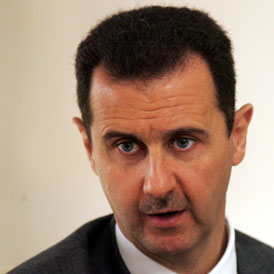Syrians dismiss Assad’s promise of reforms
Damascus and several cities across Syria are teeming with anti-government protesters following a speech by President Bashar al-Assad in which he called for stability and pledged new reforms.
Three months into popular unrest against his 11-year rule, President Assad said that the Middle Eastern country’s problems should be sorted out internally, and implied that the bloodshed which has beleaguered the country has been instigated by political “saboteurs”.
“The solution is to solve the problem with our own hands,” said Mr Assad in his third public address since the uprising began.
“What do we say about these political positions? About the pressure from the media, the advanced telephones that we started seeing spreading in Syria in the hands of saboteurs, the fabrications? We cannot say these are acts of goodwill. This is definitely a conspiracy.”

He added that he had commissioned the Justice Ministry to “carry out a study about extending the parameters of the amnesty”, the implication being that he would will not exact revenge on his political opponents.
About the pressure from the media, the fabrications? We cannot say these are acts of goodwill. This is definitely a conspiracy – Bashar al-Assad
In an apparent attempt to placate protesters who have called for him to step down from power, and in doing so usher in democratic reforms, Mr Assad said he would hold urgent meetings with Syrian “personalities”.
“(The committee) has decided to hold a consultative meeting in the next few days and will invite more than a hundred personalities to discuss with them the criteria and mechanisms, and after that dialogue will begin immediately,” he said.
Mr Assad also made promises of a new electoral law, a commitment to crush corruption and media reform.
Mr Assad’s speech was dismissed as ‘unconvincing’ by Foreign Secretary William Hague, who said in a statement: “If President Assad is to restore any credibility the Syrian people need to see concrete action, not vague promises.”
“We have been clear that rapid and real implementation of substantial reforms, addressing the legitimate demands of peaceful Syrian protesters, is what is urgently needed.
“There must also be an immediate end to violence by Syrian security forces, the release of all political prisoners, an end to the torture and abuse of those who remain in detention and access given to international humanitarian agencies,” Mr Hague continued.
The White House urged Syrian President Bashar al-Assad to take “concrete action” on his promise of political reforms and called on him to halt a violent crackdown on civilians.
“I’m not saying the words are meaningless but he needs to act upon them,” White House spokesman Jay Carney told reporters when asked about Assad’s pledge of a national dialogue to address a wave of protests against his rule.
But Mr Assad’s reformist rhetoric appeared to do little to assuage the mood of Syria’s protesters, who spilled out onto the countries streets following the speech.
Many said Mr Assad’s appearance had inflamed their anger and reinforced their resolve to oust him from power, following months of violence, with activists saying that government security forces have killed more than 1,400 people and arrested over 10,000 in a bloodyd crackdown on protsests.
“No to dialogue with murderers,” chanted 300 protesters in the capital’s suburb of Irbin.
Anti-government Syrians also derided the speech on Twitter. A lecturer at King Saud University in Riyadh said: “Politicians may talk and say nothing, something well known in political discourse. Bashar talked and said nothing but trash.”
A Syrian tweeter wrote: “Lies, more lies. Do not speak, just leave.”
Foreign Secretary William Hague said President Assad’s speech today was “disappointing and unconvincing”.
He said:
“If President Assad is to restore any credibility the Syrian people need to see concrete action, not vague promises.”
He also called for an immediate end to violence by Syrian security forces, the release of all political prisoners, an end to the torture and abuse of those in detention.
Russia to use veto
Meanwhile, Russia said will use its veto rights in the UN Security Council to stop the adoption of a resolution on Syria similar to the one passed against Libya, according to President Dmitri Medvedev.
“Russia will use its rights as a permanent member of the Security Council. However, other appeals or statements on Syria, including under the UN Security Council’s auspices, are possible,” Mr Medvedev said on Monday.
“What I will not support is a resolution similar to 1973 on Libya, because I am convinced that a good resolution has been turned into a piece of paper to cover a senseless military operation,” he added.
The United States, France and Germany have called on Russia to cooperate in preparing a resolution on Syria for a vote at the UN Security Council.
Your browser does not support iframes. You could try and view the content directly
-
Latest news
-
‘It was hard not to laugh on set’ – Swede Caroline lead on root vegetable mockumentary5m

-
Teachers to be allowed guns in Tennessee schools5m

-
Tory MP defects to Labour over NHS ‘chaos’2m

-
Al Sharpton on US campus wars and the US election race between ‘two old white men’5m

-
Israel-Gaza war continues to fuel protests and division in US, France and UK4m

-





